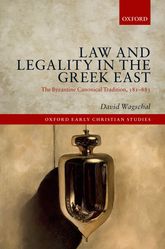
Law and Legality in the Greek East: The Byzantine Canonical Tradition, 381-883
David Wagschal
CARTEA POATE FI PREVIZUALIZA AICI [bookpreviewer bookid=”9780191034176″ previewer=”popup”]
Abstract
This book is an exploration into the legal culture of the Byzantine church. Confronting the traditio
nal narratives of decline or primitivism that have discouraged study of the subject, the author argues that a close reading of the central monuments of the Byzantine canonical tradition 381–883 reveals a much more sophisticated and coherent legal world than is generally assumed. Examining the physical shape and growth of the canonical corpus, the content of the canonical prologues, the discursive strategies of the canons, and the nature of the earliest forays into systematization, the author draws on legal theory and legal anthropology, as well as comparisons with Greco-Roman and later medieval law, to paint a fresh and nuanced picture of the Byzantine legal imagination. The author is particularly concerned to account for the curiously rhetorical and literary textures of this deeply traditional and sacralized legal world as he considers topics such as manuscript transmission, jurisprudence, professionalization, definitions of law, the language of the canons, structures of rules, legal genres, strategies of organization and compilation, and the relationship between the civil and ecclesiastical laws. Throughout, the author invites his readers to reassess their own legal-cultural assumptions as he advances an innovative legal-historical methodology for understanding this ancient law. His results challenge conventional ideas about early Christian and Byzantine law and suggest many new avenues of research in both late antique and early medieval law, secular and ecclesiastical.